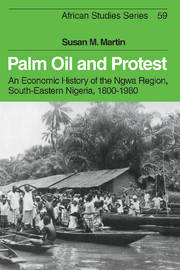Book contents
- Frontmatter
- Contents
- List of maps and figure
- Acknowledgements
- Abbreviations
- 1 Introduction
- 2 Ecology, society and economic change to 1891
- 3 The Ngwa and colonial rule, 1891–1914
- 4 The expansion of the oil palm industry, 1884–1914
- 5 The end of the boom
- 6 Cassava and Christianity
- 7 Authority, justice and property rights
- 8 Trade, credit and mobility
- 9 Production and protest: the Women Riot, 1929
- 10 Cash cropping and economic change, 1930–80
- 11 Conclusion
- Statistical appendix
- Notes
- Interviews conducted in the Ngwa region, 1980–1
- Bibliography
- Index
10 - Cash cropping and economic change, 1930–80
Published online by Cambridge University Press: 11 September 2009
- Frontmatter
- Contents
- List of maps and figure
- Acknowledgements
- Abbreviations
- 1 Introduction
- 2 Ecology, society and economic change to 1891
- 3 The Ngwa and colonial rule, 1891–1914
- 4 The expansion of the oil palm industry, 1884–1914
- 5 The end of the boom
- 6 Cassava and Christianity
- 7 Authority, justice and property rights
- 8 Trade, credit and mobility
- 9 Production and protest: the Women Riot, 1929
- 10 Cash cropping and economic change, 1930–80
- 11 Conclusion
- Statistical appendix
- Notes
- Interviews conducted in the Ngwa region, 1980–1
- Bibliography
- Index
Summary
After 1929, the political and economic framework within which Ngwa farmers operated underwent a complex series of changes, which will be surveyed chronologically in this chapter. The period 1930–80 is given unity by the fact that the real producer prices offered by import–export traders for palm oil and kernels continued their remorseless decline. However, the causes of this decline and the nature of the colonial response to it changed as the 1930s Depression was succeeded by the Second World War and by the rise of Marketing Boards and development planning. The pace of change hastened after 1940, as the state came into increasingly close contact with Ngwa villagers through the agency of tax collectors, produce inspectors and extension workers. Meanwhile, the creation of new institutions of representative government at the local and national levels brought increasing numbers of Ngwa men into the official political arena. This kind of politics now began to join trade as a means by which wealth might be used to gain eminence, irrespective of lineage-based seniority. In the trading sector, the increases in European monopoly power achieved during the 1920s were consolidated and then preserved within the Marketing Board system.
After the Second World War, the rapid expansion of Nigerian towns and of state employment created additional means by which the Ngwa might escape their confirmed export sector impasse. Christianity and cassava, which had been widely adopted during and after the First World War, became increasingly important within the changing regional economy which emerged from the Second. Western education became increasingly useful as a qualification for employment within the rapidly expanding state sector; and cassava became a major cash crop within the flourishing town–country trade.
- Type
- Chapter
- Information
- Palm Oil and ProtestAn Economic History of the Ngwa Region, South-Eastern Nigeria, 1800–1980, pp. 119 - 136Publisher: Cambridge University PressPrint publication year: 1988

